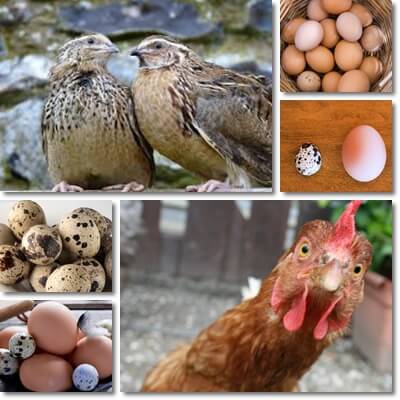The reason why quail eggs are seen as a holy grail of health is because not everyone is looking to put in the effort necessary to improve their health. Instead, they are looking for that one food that could miraculously revert the effects of all of their bad dietary habits and boost their health. But true health is an everyday conscious effort to eat clean and enjoy a balanced and varied diet. So before you completely disregard chicken eggs, know there are a lot of unjustified claims regarding the nutritional superiority of quail eggs which are actually not that much better for your health.
Myths and truths about quail eggs vs chicken eggs
Do quail eggs have high cholesterol than chicken eggs?
There is no such thing as good and bad dietary cholesterol. There is only one type of cholesterol from food and it’s the same in all animal products from beef and dairy to chicken, duck, quail and all eggs. It’s the cholesterol in our blood that is classified as good or bad according to its effects on our health. Cholesterol from food is simply an essential nutrient we need, albeit in smaller amounts. And the reason it’s not bad for you is because it is not all just converted directly into blood cholesterol after digestion, serving no other purpose.

Instead cholesterol from food is used to make digestive enzymes, synthesize hormones that impact fertility, neurotransmitters that regulate mood, appetite and sleep and synthesize vitamins. Blood cholesterol on the other hand takes on both positive and negative attributes because it’s a result of how much excess weight we have from eating too much of anything and thus mirrors our general health. It’s not cholesterol from food that is bad for you, but other fats and sugars that cause weight gain and disease, resulting in cardiovascular problems such as high blood cholesterol or diabetes. So know that quail and chicken eggs have the same cholesterol and it’s good for your health in small amounts.
Are quail eggs lower in cholesterol?
This is false. Actually, quail eggs have more than double the cholesterol of chicken eggs. According to the USDA, 100 g of quail eggs have 844 mg of cholesterol (the equivalent of 11 quail eggs, 9 grams per egg) vs 100 g of chicken eggs which have 373 mg of cholesterol (the equivalent of 2 chicken eggs, 50 grams per egg).
The reason why quail eggs have more cholesterol than chicken eggs is because quail eggs are both naturally higher in the nutrient, and have a higher egg yolk to egg white ratio. Since almost all of the fat and the entire content of cholesterol in eggs is located in the yolk, quail eggs end up providing more cholesterol than chicken. So you get both more yolk per egg, and more cholesterol and other fats, from eating quail vs chicken eggs.

Quail eggs have more egg yolk and less egg white vs chicken
This is actually true. Compared to chicken eggs, quail eggs have more egg yolk and less egg white. Vs quail, chicken eggs have more egg white and less egg yolk. On average, the egg yolk is one third of the liquid weight of the egg in chicken eggs, and the egg white is about two thirds. The opposite is true for quail eggs.
Quail eggs are better for diabetes
Not really. In fact, neither quail nor chicken eggs actually help treat diabetes, and most diabetics are advised by their healthcare provider to generally avoid eating eggs of any kind. Or limit intake to one or two eggs a week. Or just eat egg whites vs whole eggs. The reasoning behind this recommendation is that type 2 diabetes is often brought on, and worsened, by weight gain which is a result of eating too much in general, especially high carb and high fat foods which are high in calories.
In addition to processed foods, high fat foods such as cooking oils or cheeses or eggs are high in calories as well and can encourage weight gain when consumed too frequently and in too high amounts. Eating too many eggs which are moderately rich in calories could further add to the weight gain in diabetes and worsen the condition. Not to mention that most diabetics who are also suffering from high blood cholesterol should not eat too much of any food that is too rich in fat and calories.
Can a diabetic eat quail eggs?
In fact, both quail are chicken eggs are good for blood sugar control. Eggs in general are good for high blood sugar because they have lots of protein and fat which take longer to digest and slow down the digestion of carbohydrates from other foods resulting in lower glycemic effects. Additionally, eggs themselves have almost no carbs to raise blood sugar levels with.
As a result of their nutritional makeup, eggs lengthen digestion time and cause a steadier, more controlled rise in blood sugar levels, which can be good for diabetics and anyone looking for ways to achieve better blood sugar control and lower their blood sugar levels. Eating eggs with other foods that are more significant sources of carbohydrates essentially lowers the glycemic effects of those other foods, helping achieve better blood sugar control.
Still, it is important to talk to your doctor first and ask how many eggs you should eat per week. Eggs are naturally rich in fats and moderately high in calories, so they could lead to weight gain if consumed in excess. Weight gain predisposes to diabetes and high blood sugar.
Chicken eggs raise blood cholesterol, quail don’t
Studies show dietary cholesterol does not directly and immediately raise blood cholesterol levels. Instead excess sugars and simple carbs as well as fats from high-calorie foods do via the mechanism of weight gain. Weight gain is essentially the result of getting excess calories from food, especially calories from sugars and other simple carbs and fats that are being deposited as fat tissue in the body.
Too much body fat negatively impacts all systems and organs, especially the cardiovascular system, because it requires the entire body to cope with excess fat deposits. So eating quail or chicken eggs in moderation will not cause high blood cholesterol, but eating too much of either could up your intake of fats and calories, cause weight gain and possibly lead to high blood cholesterol from there on.
Are quail eggs good for allergies?
It’s true that quail eggs are somewhat less allergenic than chicken eggs, duck eggs and other varieties of egg, and could potentially attenuate allergic rhinitis symptoms in some people. But while there is reason to eat quail eggs if you are more sensitive to other egg varieties, that does not make quail eggs specifically good for allergies, or a treatment for allergies. Nor does it mean quail eggs are safe to eat if you are allergic to eggs.
Allergies are a complex, immune system-mediated condition with serious implications for health. They are best managed by avoiding the allergen or allergens triggering the allergic reaction, and having essential medication with you at all times in case of accidental exposure to the allergen.
Quail eggs are more nutritious than chicken eggs
Both varieties actually have just about the same content of essential vitamins and minerals. Quail eggs have slightly more protein, fat and cholesterol, and more calories than chicken eggs and this is due primarily to a higher egg yolk to egg white ratio. But differences between quail eggs nutrition and chicken eggs nutrition are minor so you end up getting about the same nutrition whatever your choice of egg. The slight difference in nutritional value does not produce significant differences in terms of health effects.
Quail vs chicken eggs nutritional values comparison
- Raw, whole quail eggs vs chicken eggs (100 g)
- Energy: 158 kcal – 143 kcal
- Protein: 13.05 g – 12.56 g
- Fat: 11.09 g – 9.51 g
- Cholesterol: 844 mg – 372 mg
- Vitamin A: 156 mcg – 160 mcg
- Vitamin D: 1.5 mcg – 2 mcg
- Vitamin B12: 1.58 mcg – 0.89 mcg
- Folate (vitamin B9): 66 mcg- 48 mcg
- Vitamin C: 0 mg – 0 mg
Are raw quail eggs less likely to contain Salmonella?
Any egg can potentially harbor pathogenic bacteria, including quail. The risk of a Salmonella infection from raw or undercooked quail eggs is about the same as that from raw or undercooked chicken or other types of eggs. Just because there have been more reported cases of foodborne disease from chicken eggs, that doesn’t mean that quail eggs have lower risks of causing food borne illness, or no risks.
Actually, in Asian countries where quail eggs are preferred over chicken, there are quite a lot of reports of Salmonella infections caused by eating quail eggs. And until they become as big a part of the Western diet as chicken eggs, no factual comparison can be made. In any case, all eggs are best eaten well cooked. Raw, undercooked or improperly handled eggs of any kind are potential sources of foodborne disease.
Conclusion
Overall there are few significant nutritional differences between quail and chicken eggs, except for quail eggs having more than double the cholesterol content in chicken eggs. Which is not actually a bad thing so long as intake is reasonable. Also, dietary cholesterol doesn’t raise blood cholesterol levels directly, or all by itself. So when it comes to choosing between quail or chicken eggs, know that neither has significantly more health benefits than the other, when part of a balanced and varied diet that promotes clean eating.
